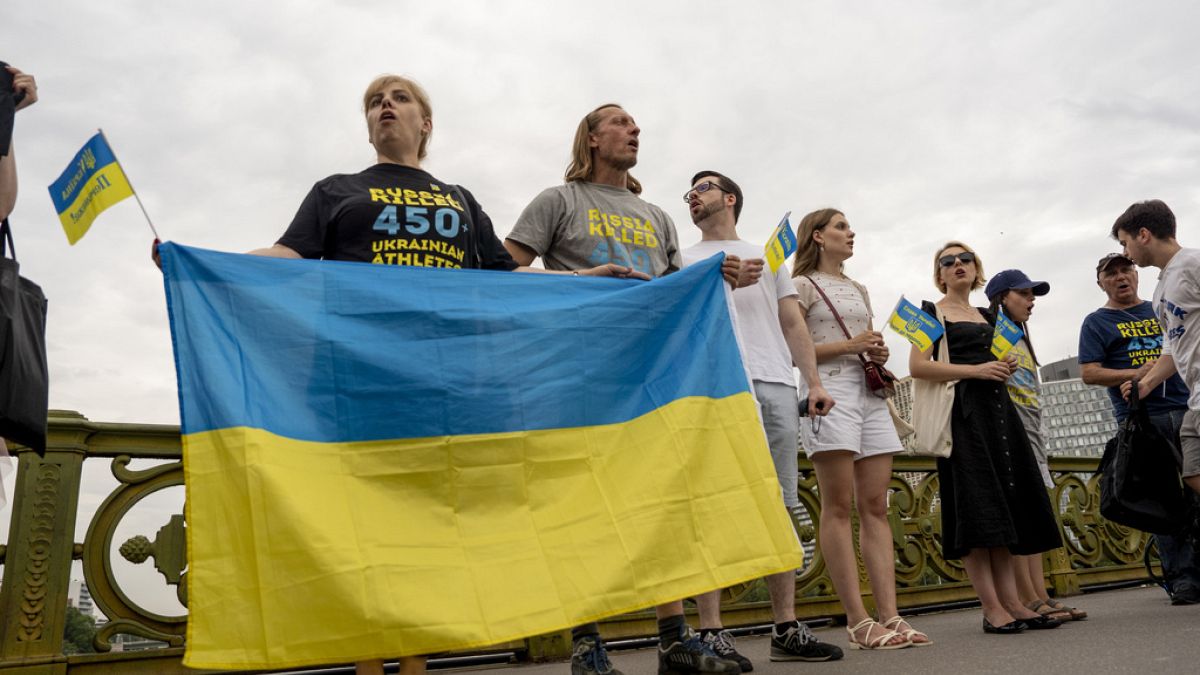In Russia, the Olympics aren’t being shown on TV and some politicians and media figures have even described those willing to compete in Paris as traitors.
Rarely on the podium and banned from the Olympic opening ceremony, 15 Russian athletes competing at this year’s Games have an uneasy status as “Individual Neutral Athletes” following the Russian invasion of Ukraine.
Some in the Olympic Village opposed them taking part, and Russian opinion is divided.
In Russia, the Olympics aren’t being shown on TV and some politicians and media figures have even described those competing in Paris as traitors.
“We’re here to fight for ourselves,” said 20-year-old tennis player Diana Shnaider, adding that it was “amazing” to be at her first Olympics.
She and Mirra Andreeva became the first Russians to win a medal at the Paris Olympics, taking silver in women’s doubles on Sunday.
Shnaider and Andreeva’s silver in the tennis was the first for Russian athletes. They stood on the podium in matching green-and-white tracksuits as a green flag with the inscription AIN — the French acronym for Individual Neutral Athlete — was raised.
The Ukrainian government and Olympic committee wanted Russian athletes excluded from all international sports and opposed IOC efforts to include them as neutral athletes.
Ukraine briefly boycotted Olympic qualifying competitions that allowed Russians to attend but changed their policy facing the risk of not being represented at the Olympics at all.
More than 3,000 Ukrainian athletes and coaches have fought in the war, and nearly 500 have died, according to the Ukrainian Sports Ministry.
This year’s Olympic Games in Paris see only 140 athletes from Ukraine, marking the country’s smallest summer Olympic delegation in history.
Activists gathered information from Russian athletes’ social media in the period leading up to the Olympics, flagging posts they considered showed support for the war.
When asked about her likes under two of these flagged posts after losing in Sunday’s final, Shnaider responded: “I’m not going to answer anything about politics here.”
Ukrainian gold-medallist high jumper Yaroslava Mahuchich spoke out about neutral athletes the next day, asking “how can a terrorist be allowed to compete in a competition about peace?”
“The Olympic Games are about peace,” she said. “But Russia didn’t stop, and during these Games, there were massive attacks on Ukrainian cities.”
‘Neutrals’ only a fraction of Russia’s athletes
Of the 32 “neutral” athletes in Paris, 17 previously represented Belarus, and only 15 represented Russia.
At the last Summer Olympics in Tokyo, there were more than 300 Russians.
In gymnastics and weightlifting, Russian teams skipped qualifying rounds in protest of being forced to compete as neutrals or undergo vetting, including social media checks.
Some athletes even qualified accepted their Olympic invitations and withdrew weeks before the Games began. The IOC lists 10 Russians and one Belarusian who “initially accepted but subsequently declined.”
It wasn’t clear whether they made the decision to withdraw under pressure at home.
At least 82 athletes competing at this year’s Olympics were born in Russia, including the neutral athletes, according to statistics from Norwegian broadcaster NRK.
Of the 60+ athletes competing for other nations, some have lived outside Russia for years or moved abroad as children. Others switched their sporting allegiance since Russia’s invasion of Ukraine.

